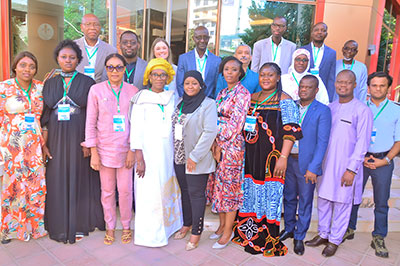
This buy-in of the Agency for All project aims to build research capacity of selected research institutions from Ouagadougou Partnership (OP) countries, in support of the OP Research Agenda as part of its Beyond 2020 Strategy. Funded by USAID West Africa Office (USAID/WA), it is a two-year (July 2023 – June 2025) activity which will be conducted by EVIHDAF, and the Center on Gender Equity and Health at the University of California in San Diego (GEH/UCSD), with support from Makerere University in Uganda, and Sambodhi in India, which are partners on the Agency for All project.
The Bill & Melinda Gates Foundation has provided funding to the OP Coordination Unit (OPCU) that has been awarded to selected research institutions to conduct research activities in line with the OP Research Agenda. This project will support capacity building of these research institutions. As a member of the OP Research Advisory Board, USAID/WA will catalyze support to the OPCU through a collaboration with Agency for All to provide tailored capacity building to the selected research institutions throughout the course of their grants. The vision of this capacity building initiative is to support the OPCU Research Agenda and grantees to enhance the research capacity of grantees by providing comprehensive training, technical support, and resources to enable them to independently conduct high-quality research and generate evidence-based solutions to local FP/SRH challenges.
This vision is supported by the following objectives:
The proposed technical scope of work for the project is organized around Phases:

This approach adopts a research life cycle approach that prioritizes co-design, localization, and collaboration throughout its phases of work to provide tailored capacity building to respond to identified capacity gaps and needs of research institutions in OP countries in support of FP/SRH research to accelerate progress in meeting national priorities. We plan to adopt a participatory and collaborative approach at the outset of the project, establishing strong working relationships with USAID/WA, OPCU, grantees, and ongoing or closed regional projects (e.g., Evidence for Development (E4D), PROPEL Health).
Launched in 2011, the Ouagadougou Partnership (OP), is a regional initiative in West Africa focused on accelerating progress in family planning (FP) and SRH in response to high fertility rates couples with low contraceptive prevalence rates (CPR) and substantial regional individual, social, community and structural barriers. The OP brings together governments, civil society organizations, donors, and other stakeholders to collaborate and coordinate efforts to improve access to and use of FP services and improve SRH outcomes across nine francophone countries: Benin, Burkina Faso, Côte d’Ivoire, Guinea, Mali, Mauritania, Niger, Senegal, and Togo.
To access the Agency for All project website, click here.